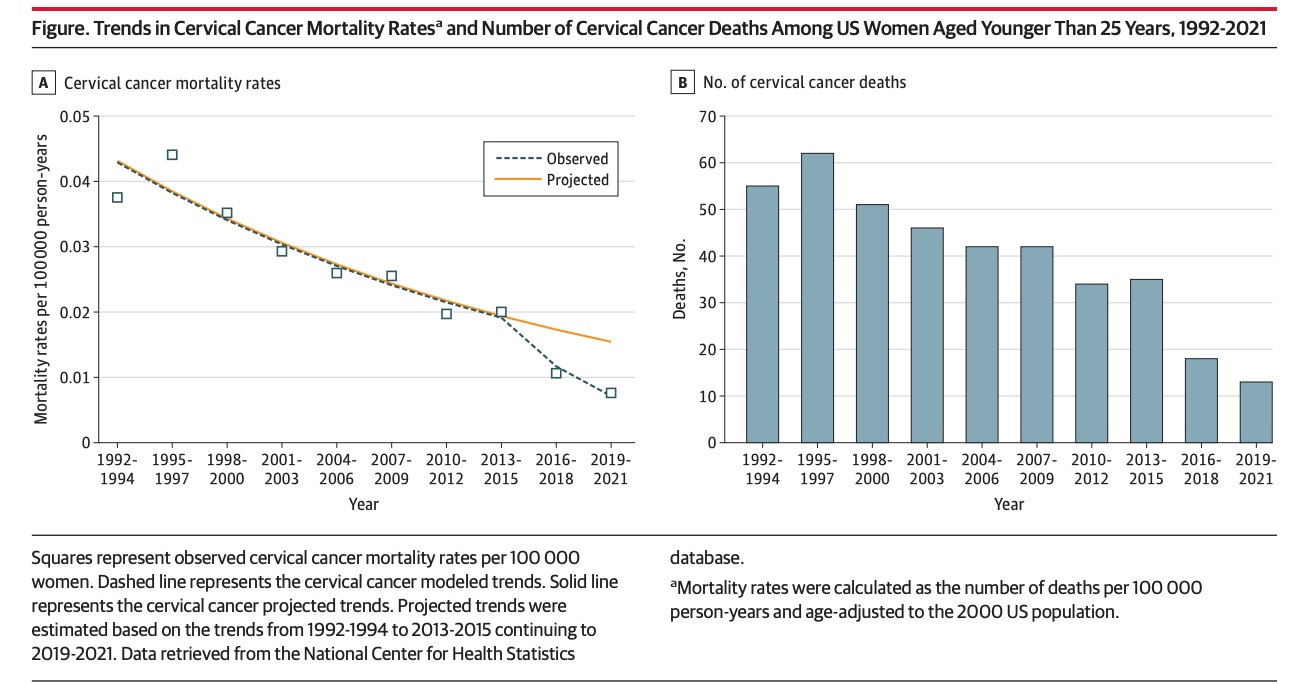Chronicle Med/Sci: Is the Gardasil vaccine against HPV safe? RFK Jr. says no, but researchers maintain that it has lowered cervical cancer rates dramatically.
RFK Jr.'s involvement in lawsuits against Gardasil manufacturer Merck was a major issue in his confirmation hearing for Secretary of Health and Human Services.
Editor’s Note: Among the journalistic hats the Chronicle’s editor has worn for nearly half a century is that of a science reporter, including 25 years as a correspondent for Science magazine and a number of years teaching science journalism at NYU and Boston University.
In the fall of 1991, the current editor of the Chronicle, who was then just starting a 25 year stint as Paris correspondent for the journal Science, traveled to Heidelberg, Germany to visit the laboratory of virologist Harald zur Hausen and write a profile of him. Fifteen years earlier, zur Hausen had first published his theory that cervical cancer was caused by the human papillomavirus (HPV), a contention that was at first controversial. The so-called viral theory of cancer had waxed and waned over the previous 100 years, but zur Hausen thought at least some cancers had a viral origin—and within a decade his HPV theory proved to be right.
Zur Hausen also proved that HPV played an important role in cancers of the penis, vulva, mouth and throat, and other tissues. In 2008, he received the Nobel Prize for his discovery, which he shared with the discoverers of the AIDS virus, HIV.
Cervical cancer had long been a major killer of women, although improvements in early detection were slowly helping to improve survival rates.
Based on the new research, the pharmaceutical giant Merck developed the vaccine we know today as Gardasil; the FDA approved it for girls and young women in 2006, and for boys and young men in 2009. Gardasil or other anti-HPV vaccines are now used all around the world, and are credited with dramatically reducing both incidence and death from cervical and other cancers.
Yet cervical cancer is still a serious problem, and it is still a killer. The American Cancer Society estimates that more than 13,000 new cases of invasive cervical cancer will be diagnosed in 2025, and that more than 4,000 women will die. And of course the decision about how best to protect young girls from cancers that might arise later in life rests almost always with their parents.
But as with so many vaccines, claims that Gardasil was causing harm, especially to young women, began to arise more than a decade ago. Hundreds of lawsuits have now been filed, a very large number by the Los Angeles personal injury law firm of Wisner Baum; on January 22, the trial of the first case began in Los Angeles Superior Court. Like many other claimants, the plaintiff maintains that Gardasil caused her to contract an autoimmune disease known as postural orthostatic tachycardia syndrome (POTS), as well as small fiber neuropathy, a condition that affects small nerves that transmit pain, temperature, and touch.
As many readers will know, Gardasil and vaccine safety in general played a major role in the confirmation hearing of Robert F. Kennedy, Jr. for Secretary of Health and Human Services. Some senators, including Elizabeth Warren, grilled RFK Jr. about his ties with Wisner Baum, to which he has referred many clients for its lawsuits against Merck (and one of his sons also works for the firm.) RFK Jr. finally agreed to divest his interests in the litigation, apparently by signing them over to this same son.
To many here in the Hudson Valley, RFK Jr. is a hero, especially because of his work in the 1990s as an environmental attorney and advocate dedicated to protecting the Hudson River from pollution and toxic chemicals. Yet in more recent years he has become controversial because of his alleged anti-vaccine stance, and his often inconsistent statements about vaccine safety and whether children should be vaccinated.
But it is not our purpose here to get involved in polemics about RFK Jr. Rather, let’s turn to the evidence about Gardasil.
There are two main ways that medical researchers judge a vaccine. First, by how effective it is at doing the job it was designed to do, that is, preventing disease; and second, by its safety record. These two factors are not entirely independent, even though they are often studied independently. Thus we might be willing to accept a higher rate of adverse effects from a vaccine that is designed to protect us against a very serious or even deadly disease. But most importantly, we want good data about both factors, so we can make informed decisions about such balancing acts.
It will come as no surprise to readers that health officials in the United States and around the world insist that Gardasil is both effective and safe. They base these judgments on hundreds of studies that have been conducted starting before the vaccine was approved, and which continue to be carried out worldwide. Let’s look at some of the most recent ones.
Vaccine effectiveness.
— In 2020, a team of researchers based in Sweden obtained access to a nationwide database of Swedish demographic and health registers totaling 1,672,983 girls and women who were 10 to 30 years old, and covering the period 2006 (when Gardasil first became available) through 2017. The team controlled for factors ranging from county of residence, family background, parental education, household income, and maternal disease history. The researchers found that girls who had been vaccinated before the age of 17 had a cervical cancer rate of only about 20% that of unvaccinated subjects; women vaccinated between the age of 17 and 30 years had only about half the rate of cervical cancer of those in the unvaccinated group.
— Also in 2020, researchers from Denmark, Iceland, Norway and Sweden conducted a 14 year long-term followup study of a cohort of girls 16 to 23 years of age, in a randomized, double blind, placebo study. The vaccinated girls and women had no cervical cancer cases during this entire time, that is, 100% effectiveness. (The unvaccinated group had a cervical cancer rate consistent with the background population.)
— A 2024 study, conducted in Scotland, looked at the effectiveness of the vaccine depending on the age at which it was administered. Girls who received the vaccine at 12 or 13 years of age showed no cases of cervical cancer no matter how few doses they had received. But for girls and women 14 to 22 years of age, three doses were necessary to achieve a statistically significant reduction in the rate of cervical cancer. These researchers stressed the importance of vaccinating at an early age.
Vaccine safety.
Most vaccines can produce mild side effects, as those who have gotten their flu or Covid shots know. Gardasil is no different. Common effects include headache, fever, nausea, dizziness, and pain at the injection site.
But the most recent studies for Gardasil fail to find evidence for the more serious kinds of disorders that those who have sued Merck are claiming.
— A 2020 study in Denmark looked at a cohort of 869 patients diagnosed with some of the syndromes which are claimed to be caused by Gardasil, including chronic fatigue syndrome, complex regional pain syndrome, and postural orthostatic tachycardia syndrome (POTS). Vaccination against the HPV virus did not increase the rate of these disorders in this group over those who had not been vaccinated.
— A 2021 study of South Korean adolescent girls looked at 441,399 girls aged 11 to 14 years of age, 382,020 who had been vaccinated against HPV and 59,379 who had not. Again, there was no increase of the kinds of adverse effects that have been claimed from vaccination, with the possible exception of an increase in migraines—although even that was not statistically clear.
This research does not mean that Gardasil could not have caused a rare side effect in an individual who received the vaccine. But in general, proving that cannot rely on purely anecdotal evidence, for example of the kind that has led some to wrongly conclude that autism is caused by vaccination. Proving causation relies on the kind of large-scale studies cited above, and the evidence for Gardasil (or autism) is just not there. Rather, the evidence we have suggests that Gardasil is a very safe vaccine.
What we do know for sure is that both the mortality rate from cervical cancer and the total number of deaths from cervical cancer have declined since vaccination began, based on a number of studies that have succeeded in causally attributing a lot of that decline to vaccination. (See chart below.) Just between 2012 and 2019, for example, cervical cancer incidence in U.S. women declined about 65%.
Researchers are worried, however, about signs of a decline in vaccination during the Covid-19 pandemic, although 75% of girls and young women were still receiving Gardasil (the only vaccine currently licensed in the U.S.) as of 2023.
Here in Croton, a community whose population is about 27% under 18 years of age, parents have to make a lot of decisions about what is best for their children, including what vaccinations they should get. One can hope that these decisions will be based on the best science, and not on politics.
************************************************************************************************************
To share this post, or to share The Croton Chronicle, please click on these links.
Comments policy: Please be polite and respectful, regardless of your views.







Would you go to medical doctor to file a lawsuit?
Similarly, would you accept the advice of a random male about a disease affecting women?
Kennedy is way out of his league.